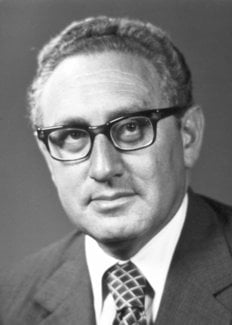Henry Kissinger
Biographical

Henry Alfred Kissinger was the 56th Secretary of State of the United States from 1973 to 1977, continuing to hold the position of Assistant to the President for National Security Affairs which he first assumed in 1969 until 1975. After leaving government service, he founded Kissinger Associates, an international consulting firm, of which he is chairman.
Dr. Kissinger was born in Fuerth, Germany, on May 27, 1923, came to the United States in 1938, and was naturalised a United States citizen on June 19, 1943. He received the BA Degree Summa Cum Laude at Harvard College in 1950 and the MA and PhD Degrees at Harvard University in 1952 and 1954 respectively.
From 1954 until 1971 he was a member of the Faculty of Harvard University, both in the Department of Government and at the Center for International Affairs. He was Associate Director of the Center from 1957 to 1960. He served as Study Director, Nuclear Weapons and Foreign Policy, for the Council of Foreign Relations from 1955 to 1956; Director of the Special Studies Project for the Rockefeller Brothers Fund from 1956 to 1958; Director of the Harvard International Seminar from 1951 to 1971, and Director of the Harvard Defense Studies Program from 1958 to 1971. (He was on leave of absence from Harvard from January 1969 to January 1971).
Secretary Kissinger has written many books and articles on United States foreign policy, international affairs, and diplomatic history. Among the awards he has received are the Guggenheim Fellowship (1965-66), the Woodrow Wilson Prize for the best book in the fields of government, politics and international affairs (1958), the American Institute for Public Service Award (1973), the International Platform Association Theodore Roosevelt Award (1973), the Veterans of Foreign Wars Dwight D. Eisenhower Distinguished Service Medal (1973), the Hope Award for International Understanding (1973), the Presidential Medal of Freedom (1977) and the Medal of Liberty (1986).
He has served as a consultant to the Department of State (1965-68), United States Arms Control and Disarmament Agency (1961-68), Rand Corporation (1961-68), National Security Council (1961-62), Weapons Systems Evaluation Group of the joint Chiefs of Staff (1959-60), Operations Coordinating Board (1955), Director of the Psychological Strategy Board (1952), Operations Research Office (1951), and Chairman of the National Bipartisan Commission on Central America (1983-84).
From 1943 to 1946 Dr. Kissinger served in the U.S. Army Counter Intelligence Corps and from 1946 to 1949 was a captain in the Military Intelligence Reserve.
He married Ann Fleischer in 1949 and was divorced in 1964. There were two children, Elizabeth and David. In 1974 he married Nancy Maginnes.
Selected Bibliography
By Kissinger
Diplomacy. New York: Simon & Schuster, 1994. (A historical analysis of modern diplomacy including a defense of his policies during the Vietnam war.)
Nuclear Weapons and Foreign Policy. New York: Harper, 1957.
The White House Years. Boston: Little Brown, 1979. (Memoirs, covering November 1968-January 1973.)
A World Restored: Metternich, Castlereagh and the Problems of Peace 1812-22. Boston: Houghton Mifflin, 1957. (Kissinger’s doctoral dissertation.)
Years of Upheaval. Boston: Little Brown, 1982. (Memoirs, covering January 1973 to the resignation of President Nixon.)
Other Sources
Hersh, Seymour M. The Price of Power: Kissinger in the Nixon White House. New York: Summit Books, 1983. (An indictment, based on extensive research.)
Isaacson, Walter. Kissinger. A Biography. London: Faber and Faber, 1992. (Critical, but balanced.)
Schulzinger, Robert D. Henry Kissinger: Doctor of Diplomacy. New York: Columbia Univresity Press, 1989. (Scholarly.)
This autobiography/biography was written at the time of the award and first published in the book series Les Prix Nobel. It was later edited and republished in Nobel Lectures. To cite this document, always state the source as shown above.
Henry Kissinger died on 29 November 2023.
Nobel Prizes and laureates
Six prizes were awarded for achievements that have conferred the greatest benefit to humankind. The 12 laureates' work and discoveries range from proteins' structures and machine learning to fighting for a world free of nuclear weapons.
See them all presented here.
